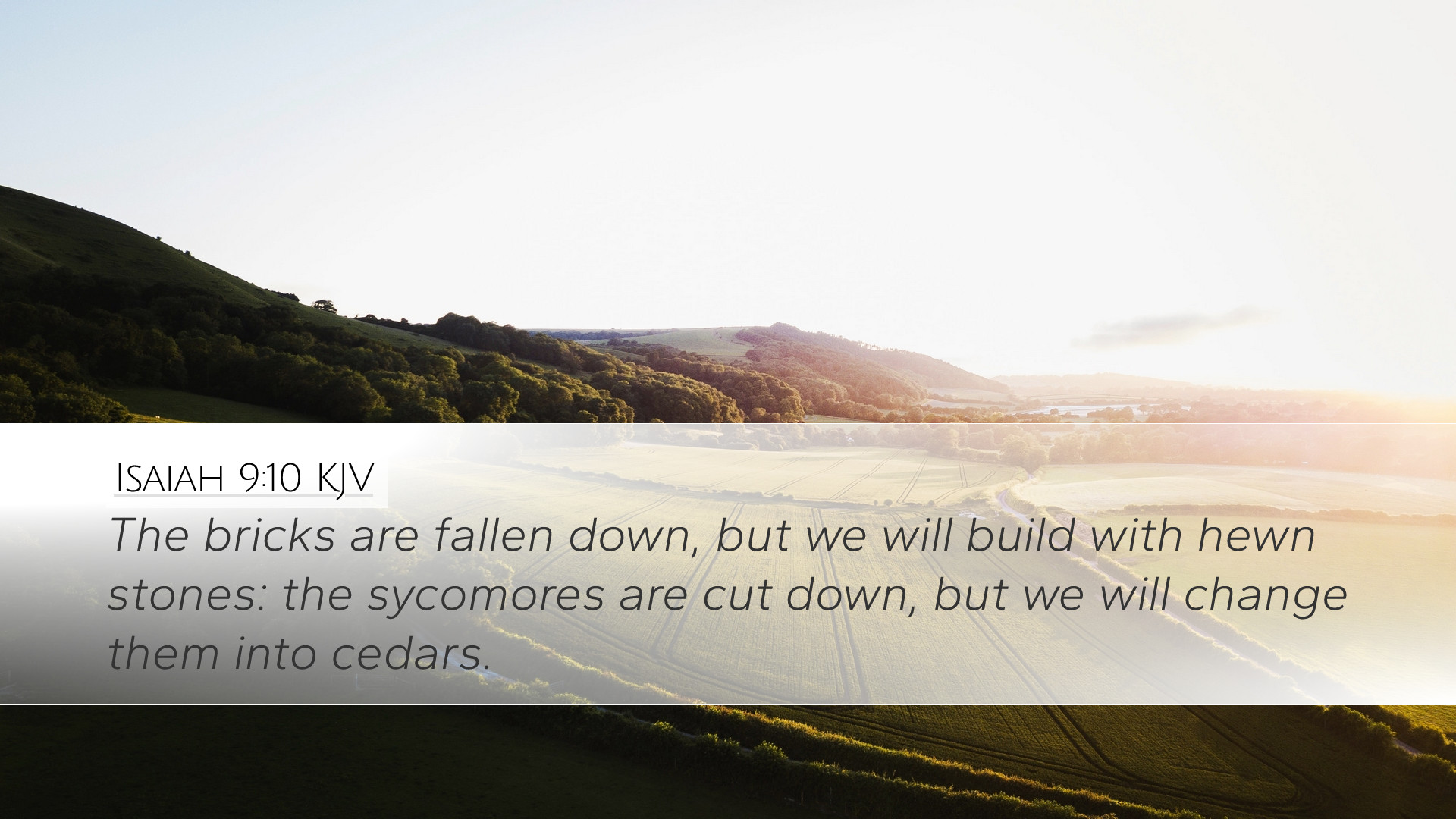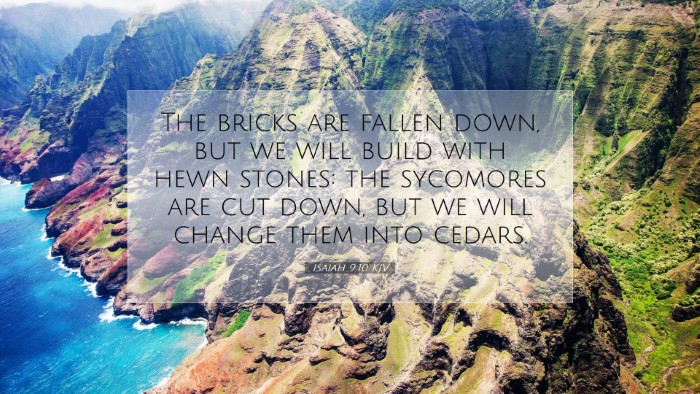Commentary on Isaiah 9:10
Verse: "The bricks have fallen down, but we will build with hewn stones: the sycamores are cut down, but we will change them into cedars."
Introduction
This verse serves as a poignant reflection of the state of Judah during a time of crisis. The declaration made here encapsulates both a reaction to calamity and an assertion of human will against divine judgment. As we explore the insights from renowned public domain commentaries, we will delve into the theological implications, historical context, and practical applications of this scripture.
Historical Context
Isaiah's ministry occurred during a tumultuous period in Israel's history, marked by political instability and impending judgment from foreign powers. The Assyrian Empire's threats loomed large over Israel, creating a backdrop of fear and uncertainty. In Isaiah 9:10, we see a reflective yet defiant attitude of the people towards their situation.
The Defiance of Human Will
Matthew Henry observes that the people’s response demonstrates a common human trait of resilience against adversity. Instead of acknowledging the sin that led to their downfall, they resolve to rebuild with greater strength, indicating a refusal to submit to divine decree. This can be seen as both a testament to human ingenuity and a tragic misalignment with God’s will.
Albert Barnes remarks on the irony of their statement. In their refusal to capitulate to their circumstances, the people proclaim their intent to replace the ‘bricks’ of their fallen structures with ‘hewn stones’—representative of a more fortified and refined response. However, this pursuit risks failure as it operates outside the guidance of God, as a response to God's punishment should lead to repentance, not rebellion.
Symbolism in Construction
The act of construction symbolizes a deeper spiritual truth. The bricks, easily formed and destructible, represent their past, while the hewn stones and cedars signify a desire for permanence and strength. Adam Clarke emphasizes that this metaphor speaks to the human tendency to engage in self-strengthening rather than relying on divine restoration. God's desire is for His people to rebuild through repentance and faith, not mere physical renewal.
Spiritual Lessons
- Human Limitations: The verse highlights the limitations of human endeavor. While the intention to build back better seems noble, it showcases a flawed understanding of restoration without divine approval.
- Call to Repentance: The call embedded in this passage is clear; true restoration comes through turning back to God. The efforts to replace and rebuild signify a need for introspection on where true strength lies.
- The Sovereignty of God: The message underscores that while man may plan for reconstruction, it is ultimately God who determines the endurance of those plans.
Theological Implications
This verse also touches on broader theological implications regarding human pride and self-reliance. When faced with destruction, the inclination is to take action that reflects our earthly wisdom rather than seeking the will of God. Henry emphasizes the necessity of a heart turned towards God in acknowledgment of human frailty.
Application for Today
For contemporary believers, this passage serves as a warning against the spirit of self-reliance that pervades modern culture. It challenges pastors and theologians to examine how often the church might echo the defiance of post-exilic Israel when confronted with trials:
- Restoration through God: True rejuvenation for the church, much like Israel’s call, must center around God’s promises and presence rather than a mere enthusiasm for renewal.
- Understanding Judgment: Judgments often serve as calls to reflection; to rebuild on the foundation of repentance is not only wise but essential for spiritual growth and community healing.
- Leading with Humility: Leaders in faith communities must remember the importance of humility and dependence on God's favor rather than solely on human ingenuity.
Conclusion
Isaiah 9:10 provides a compelling insight into the human condition, showcasing both the resilience and folly of man. With lessons on humility, repentance, and divine reliance, this passage remains profoundly relevant. It invites an introspective journey for individuals and communities alike, pushing the faithful to seek God's restoration above their own efforts. By learning from this scripture, we may better navigate our own challenges with grace and dependence on the divine.


